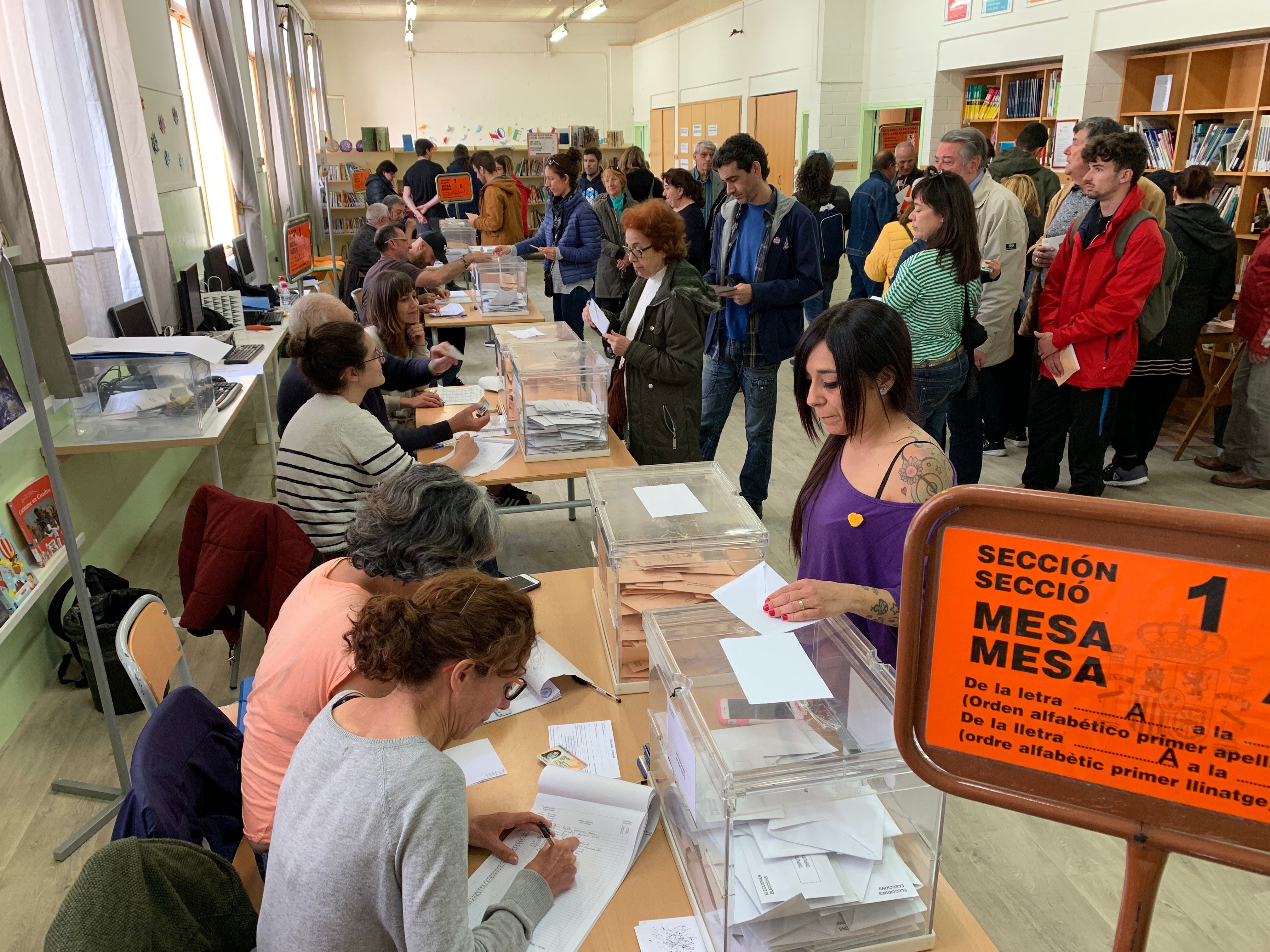Just two weeks have gone by since the last date with the polls in Catalonia and Spain, and here we go again: the electoral campaign for this spring's second series of elections is already in full flight, and in just two more weeks, on May 26th, municipal and European elections will be held. After the Spanish general election results, many more details of the new political map will be filled in on Sunday week - with autonomous community elections also being held in much of the Spanish state, although not in Catalonia.
Will Ada Colau retain her leadership of Barcelona city? Will the Socialists consolidate the political reconquest they began in April? Will the Catalan capital have its first pro-independence mayor? Among the independence parties, will the Republican Left (ERC) definitively overtake Together for Catalonia (JxCat)? And between these two, who will win the battle for Europe, Carles Puigdemont or Oriol Junqueras? Can former French PM Manuel Valls seduce Barcelona? They are just some of the unknowns to be resolved in the days that remain in the campaign, which once again - for the third election in a row - will feature the sobering spectacle of candidates forced to campaign from prison and from exile (Junqueras, Puigdemont, Comín, Ponsatí, Forn and Puig).
Barcelona, the fragmentation of power
On May 26th, 1.1 million Barcelona residents will be called on to decide who they want to govern their city from now until 2023. They can choose among more than twenty candidate lists, of which there are eight with realistic options of obtaining representation. The only certainty, right now, is that the elections will leave another highly fragmented city council, possibly even more so than over the last four years, when seven different municipal groups had representation on the 41-seat council, and mayor Colau presided over a minority municipal government, with only 11 councillors from her own Barcelona en Comú (BeC) group.
Of the list leaders with most options to enter the council, only two are standing for the second time, Ada Colau herself and Jaume Collboni, of the Catalan Socialists (PSC). The rest are running for mayor for the first time, despite being mostly familiar faces: Ernest Maragall (ERC), Joaquim Forn (JxCat), Manuel Valls on a platform supported by Ciudadanos (Cs), Josep Bou of the Partido Popular (PP), Anna Saliente of the Popular Unity Candidature (CUP) and Jordi Graupera, head of the Barcelona és Capital (BCap) list.
The surveys give ERC options to repeat the victory they won in Catalonia in the general election, which would give Barcelona its first pro-independence mayor. Running neck and neck with ERC's Maragall is Colau, who could pay the price for the election promises her administration hasn't met and the crisis in the left-wing Catalunya en Comú (Commons) group to which her municipal team is closely tied, a crisis which has left a significant number of political casualties over the last few months.
The PSC also has a chance of playing a key role, riding the wave of Pedro Sánchez's victory at Spanish level, and able to claim it has the ear of the Spanish executive. As usual, the polls are cruel to JxCat, but the party is confident that the Puigdemont factor - with the exiled Catalan leader representing the party in the European elections - will provide the necessary injection of energy to turn around the prognosis.
Poll results are also uncomfortable for Manuel Valls. When he threw his name into the electoral ring over six months ago, the surveys suggested he had a shot at becoming mayor, but little by little the demoscopes have deflated the Manuel Valls bubble. His campaign is nervous about being labelled as the Cs candidate and insist that the former French prime minister is totally autonomous. Meanwhile, the battle being fought by the PP and the CUP is to get over the 5% minimum vote level to maintain any seats at all in city hall.
Colau: battling disenchantment
44 years old. Four years ago, Ada Colau conquered the Barcelona mayoralty with a mere 176,337 votes. Back then, the flag she waved to voters was that of her high profile as an activist, but now she bears the burden of her mayoral record. The public rating of her management at the head of the Catalan capital has been falling sharply over recent months. According to the data from the last opinion survey carried out by the city itself, 42% of Barcelona citizens gave her a fail mark.
To maintain office, the message she is sending is that it is necessary to "consolidate the change." The argument is that four years has not been long enough to fulfill her electoral promises, such as the building of 8,000 public housing units that have in reality not passed the figure of 800. Thus Colau requests a second term which, she says, will allow her team to finish putting its policies into place. Conscious that she will need to reach agreements with other parties to stay in office, she openly opts for an alliance with the leftist forces, the PSC and ERC. These parties, however, mutually veto each other.
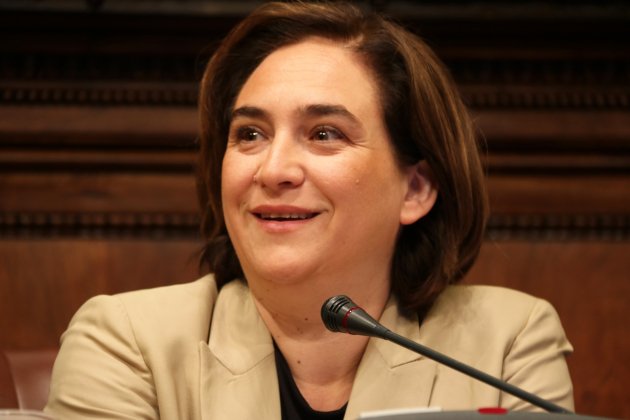
Photo: ACN
Forn: a campaign behind bars
54 years old. For more than a year and a half, he has been held in preventive jail - already over four times as long as the period for which he held the critical post of Catalan interior minister. For the moment, his candidacy has the merit of having achieved something that many saw as impossible: an agreement between the PDeCAT and the Crida, two parties in the fractured centre-right of pro-independence politics. Forn is the consensus candidate, standing under the JxCat brand. On the other hand, despite persistent attempts, he failed to convince ERC to join in a single pro-independence candidature.
Exactly three years ago, former Barcelona mayor Xavier Trias handed over to Forn as his centre-right successor. A lot of water has gone under the bridge since then. So much so, that while locked up in Estremera prison Forn considered leaving politics. However, with twenty years of experience on the Barcelona city council, he finally decided to put his name forward. He says he wants to be the motor for change. His voice during the campaign is Elsa Artadi, number two on the JxCat candidature and de facto candidate to occupy the mayoralty. Forn is competing with the disadvantage of having to campaign from prison, while also immersed in a trial in which he faces a possible 16 year sentence.
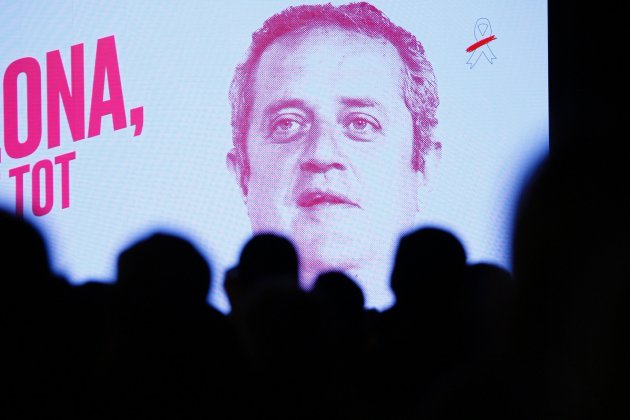
Photo: Sergi Alcàzar
Maragall: the consolidation of ERC hegemony
76 years old. He is one of the historic figures of the PSC: he was a founder of the Catalan Socialist party, and served as a government secretary and a minister in the two tripartite Catalan governments in the first decade of this century. But he burnt his membership card in 2012 when the Socialists refused to support Catalonia's right to decide its own future in a referendum.
In 2014, he joined ERC to form an electoral ticket with Josep Maria Terricabras, with whom he won the European elections in Catalonia - a historic milestone for ERC. Like Forn, he also has extensive municipal experience, having entered as a councilor in the nineties, when his brother Pasqual was mayor.
Maragall offers his hand to two parties on either side of him, to form a three-way municipal pact with JxCat and BeC, an agreement that is impossible because, although both parties seek an understanding with ERC, neither of the two groups wants anything to do with the other. Under Oriol Junqueras, the ERC see the municipal vote as the second round of the general election, and believe they can consolidate their victory on April 28th to position themselves as the hegemonic party among independence supporters.
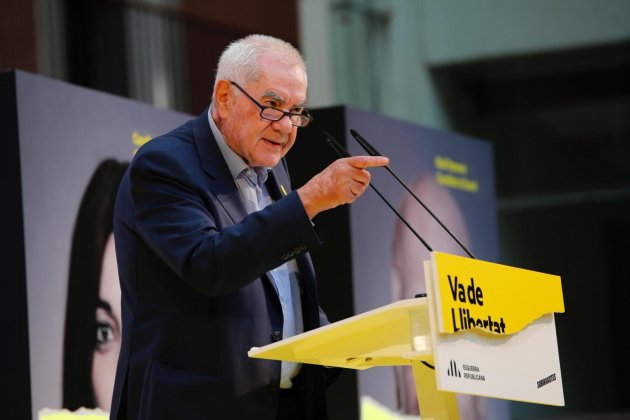
Photo: Sergi Alcàzar
Valls: backed by Cs and Pasqual Maragall's gurus
56 years old. The Ciudadanos party wanted him to be their candidate exclusively, but he aspired to a more ambitious platform, which was also to include - at the very least - the PP and the PSC. Just as on the pro-independence flank, it was an impossible mission to draw Spain's two largest constitutionalist parties into a common election bid. Cs, then, is the party on which the Valls candidacy is based, although the former French prime minister, born in Barcelona, tries to keep himself apart from some of Albert Rivera's policies, for example, the agreement with Vox in Andalusia.
Among the star signings is former Socialist mayor of L'Hospitalet, Celestino Corbacho, who is number 3 on a list that also includes members of Cs, and former members of the Catalan conservative party Unió. His campaign team is based on the advisors who led Pasqual Maragall to the presidency of Catalonia in 2003.
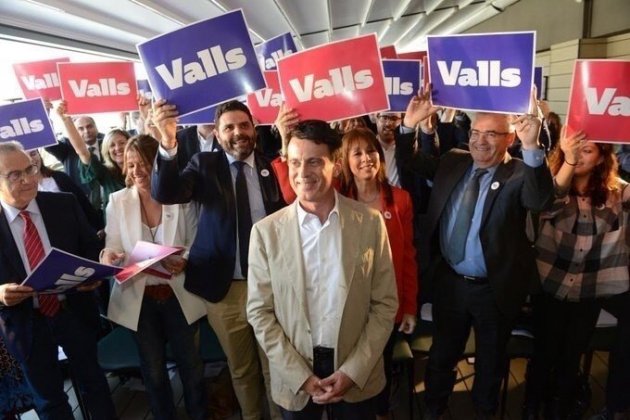
Photo: Europa Press
Collboni: the coat-tails effect
50 years old. In spring 2016, he signed an agreement to bring his PSC councillors into Ada Colau's municipal government, becoming the city's second deputy mayor. A little over a year later, however, the grassroots of Barcelona en Comú rejected this deal in a consultation, and that marked the end of the PSC's role in the current council. The Socialists were then expelled from the municipal executive for their support for imposing direct Spanish rule over Catalonia under article 155. Since then, Collboni has campaigned for and supported as many as five votes of censure against Colau.
He'll be concentrating his electoral efforts on preventing the independence trial and the Catalan procés from setting the tone for the campaign. He has the participation of Pedro Sánchez in some meetings and trusts that the victorious momentum of the Spanish Socialists will help him make a good showing on the 26th - some polls have shown the PSC as vying for the lead. On post-election pacts, he's said he'll talk with everyone.
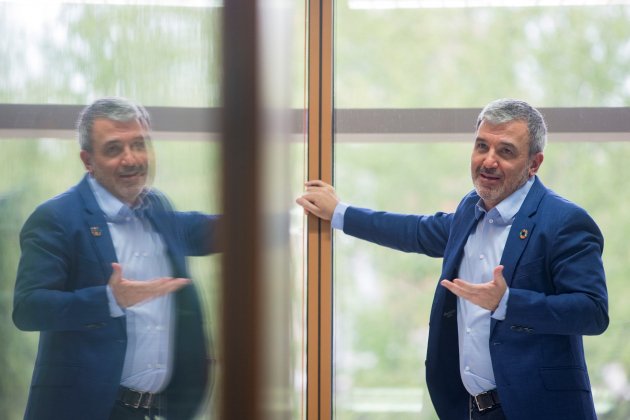
Photo: Efe
Bou: Casado's choice (like Cayetana)
64 years old, from the central Catalonia town of Vic. After sixteen years, the PP has a new face on its Barcelona mayoral posters, replacing Alberto Fernández Díaz. The shockwave of change that Pablo Casado sent out from party headquarters in Madrid has reached the Catalan capital. Casado himself promoted the baker Josep Bou into the PP candidature. He's known in unionist circles as the driving force behind the anti-independence platform Empresaris de Catalunya. In the case of Cayetana Álvarez de Toledo - number one PP candidate for Catalonia in the recent general elections - Casado's experiment flopped. We'll see what happens this time.
Bou claims to have a pure pedigree, boasting of his eight Catalan surnames. A lover of climbing, he's promised to personally take down the yellow ribbon from the Barcelona town hall façade. Until recently, internal party polls have said the PP won't win representation on the Barcelona council.
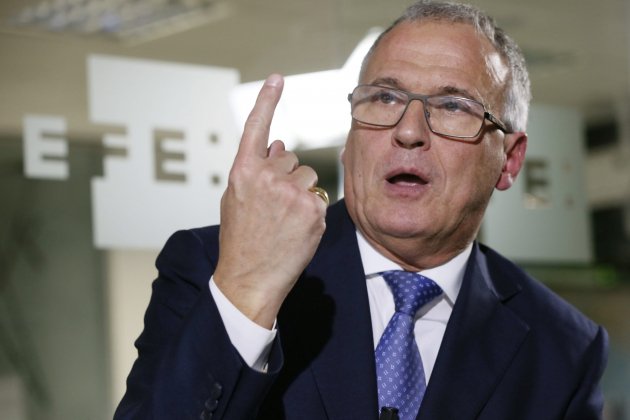
Photo: Efe
Anna Saliente: the new face of the CUP
30 years old. As required by the party's ethical code, at every new election, the CUP renews its candidates and leadership. Anna Saliente starts out with the handicap of being a stranger to most of the electorate, although the CUP voter tends to vote for the party more than the person. She is a sociologist and an activist in the Endavant strand of the left-wing, pro-independence party. Four years ago, CUP entered the Barcelona city hall for the first time with three councillors. The challenge now is to keep them.
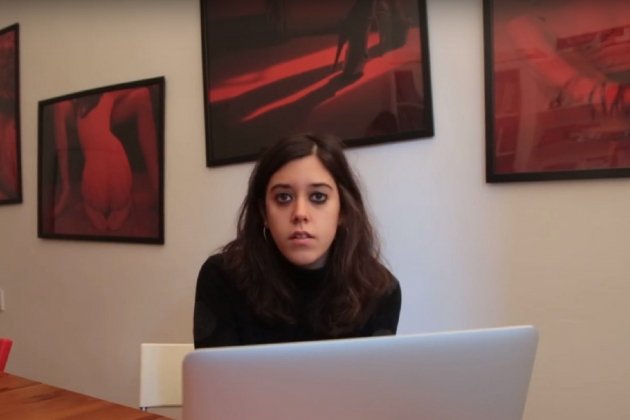
Graupera: campaign 2.0
37 years old. After this US-based political scientist's projection in television talk programmes had turned him into a pro-independence influencer, he came home to Catalonia and tried to introduce the initiative of primary elections to select a single candidate for the whole movement, but did not convince PDeCAT, ERC or CUP. On the other hand, the major ANC civil society group came on board and provided the organizational engine. 10,000 people took part in the primaries. Because his Barcelona és Capital platform has no representation at present, they have an uphill struggle in the campaign. Graupera has been going door to door for months to make his ideas known and is naturally making use of social media as the major channel to sell the candidature.
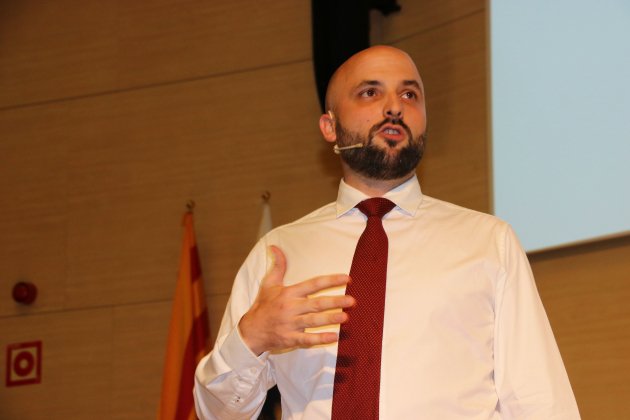
Photo: ANC
The broader municipal battles
Beyond the city of Barcelona, the local elections are likely to completely redraw the political map of Catalonia. For the first time, centre-left ERC has more candidatures to councils around Catalonia than the centre-right part of the pro-independence space - formerly represented by Convergència, now by JxCat. The Catalan centre-right will focus its efforts on maintaining its hegemonic power across Catalan territory, given the Republican Left's aspiration to take the title.
Meanwhile, the PSC aims to shore up its areas of core support along Barcelona's metropolitan beltway: municipalities such as L'Hospitalet, Santa Coloma and Cornellà, where in previous elections, Cs on one side, and ERC and the Commons on the other, poached thousands of its voters.
The Commons arrive at the electoral date in some disarray. They have fewer candidatures than four years ago, a total of 147, and in many municipalities their space has fragmented. The most extreme case is the city of Sabadell, where there will be as many as four lists fighting for the Commons' political niche.
The PP continues its downward trend and has put up half as many municipal candidatures as it did four years ago. The great hope once again is Xavier García Albiol in the city of Badalona, former mayor hoping for a comeback. Meanwhile, the CUP will work to hang on to the two key cities where it holds the mayoralty, Berga and Sabadell.
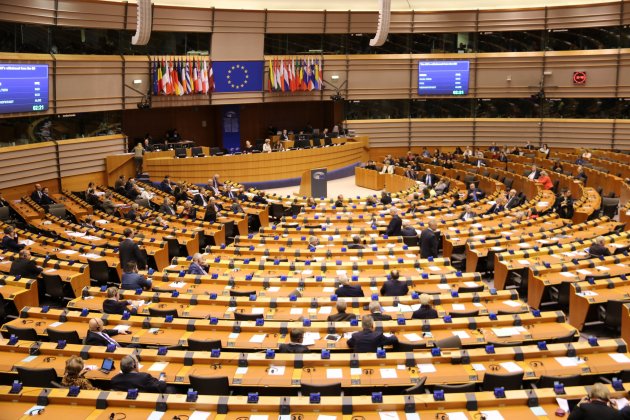
Photo: ACN
Puigdemont and Junqueras, battling in Europe
No less important is the fight for the elections to the EU parliament, held across Europe between 23rd and 26th May - in most countries, including the Spanish state, on Sunday 26th, coinciding with the municipal vote here. At continental level, the vote will be a clear "thermometer" to measure the strength of the extreme right, and the campaign will to a large extent pivot on this. The current hegemony of the European People's Party (EPP) and the Progressive Alliance of Socialists and Democrats (S&D) in the European chamber is threatened by a far right block which is stronger than ever.
However, it is common for EU parliamentary elections to reflect domestic concerns and that will certainly be the case in Catalonia: the polls will serve to measure both the power of the independence movement, and to see who will win the contention between the two major Catalan sovereignist parties - ERC and JxCat - and, specifically, the two party figureheads: the Republican Left leader, Oriol Junqueras, who has been in preventive jail for a year and a half, and the JxCat number one, Carles Puigdemont, in Belgian exile for the same period.
Junqueras took his party to first place in Catalonia at the Spanish general election two weeks ago, winning double the seats of JxCat, and naturally comes to this new electoral race strengthened. In addition, ERC are in coalition with the Basque left-wing nationalists Bildu and the Galician party BNG, under the brand Ara Repúbliques. Puigdemont, who did not run as a candidate for the Spanish Congress, is competing with the advantage of having won the previous head-to-head fight between the pair, in the Catalan elections of December 21st 2017, and having done so against the poll predictions. Last week's legal victory to overturn the Electoral Commission ban on the candidatures of the three Catalan exiles - Puigdemont, Comín and Ponsatí - was a great boost to the JxCat bid for May 26th, branded as Lliures per Europa and featuring Puigdemont's photo on its ballot papers outside Catalonia.
However, both exiled and imprisoned candidates will again suffer the difficulties of repression during the campaign. Puigdemont plans to take part on a daily basis in the main campaign events in Catalonia via videoconferencing and his campaign will take him across several European countries, including Slovenia, Germany, the UK and Belgium.
As for Junqueras, the party has asked the Electoral Commission for permission to take part from the Soto del Real jail, via videoconferencing, in several campaign events, as well as giving media interviews, as he was able to do for the first time during the Spanish general election campaign last month.
Voting system
Spain has 54 seats in the 751-member European Parliament. The electoral system used by each country to select its members varies, and in Spain the entire state is treated as a single electorate, with voters selecting just one option from 32 closed lists of candidates which have been accepted. Thus, voters throughout Spain can, if they wish, vote for the lists headed by the exiled and imprisoned Catalan leaders, just as every Spanish voter who chooses to can equally select, for example, the Extremadura regionalist list Extremeños PREX CREX or the pan-European political movement Volt Europa.
After the election on May 26th, the 54 Spanish places in the European chamber will be allocated proportionately to the percentage of votes received by each list across the whole of the state. A CIS poll published on May 9th suggested that Junqueras's list would win 3 seats and Puigdemont's one, that is, that both of the Catalan pro-independence figures would become MEPs, while the largest number of seats across Spain would be won by the PSOE (17-18).

